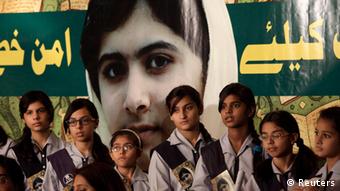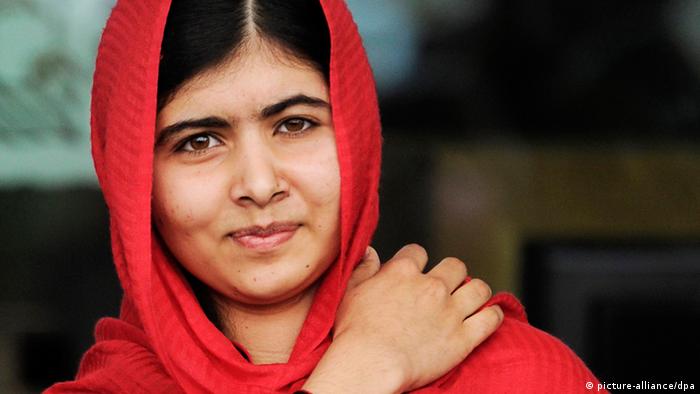Malala Yousafzai, a teenage Pakistani activist who was shot by the Taliban for advocating girls' right to education, has won this year's Nobel Peace Prize. But does she really deserve it? DW looks at the reasons.
Malala was shot by militants in October 2012 in the Swat Valley of Pakistan's restive Khyber Pakhtunkhwa province. Taliban militants claimed responsibility for the attack and said in a statement that Malala had been attacked for promoting "secularism" in the country. After receiving initial medical treatment in Pakistan, Malala was flown to the United Kingdom where she is presently residing with her family.
Before being shot, the teenager had been campaigning for girls' right to education in Swat and was a vocal critic of Islamic extremists. She was praised internationally for writing about the Taliban atrocities in a BBC Urdu service blog.
Malala has come a long way since then. She has now become an international icon of resistance, women's empowerment and right to education, and has received numerous awards, including the 2014 Nobel Peace Prize and the European Union's prestigious Sakharov Prize. Furthermore, the teenager co-founded the Malala Fund - a New York-based nonprofit that aims to improve girls' access to education - in 2013.

Malala has now become an international icon of resistance, women's empowerment and right to education
Symbol of resistance
There are many people in Pakistan for whom Malala's name has become synonymous with the fight against extremism and the Taliban.
"Malala is no more simply the name of an individual; her name symbolizes the movement for girls' education in Pakistan," Mahnaz Rahman, a veteran rights activist and resident director of the women's rights organization Aurat Foundation, told DW.
Rahman said that international recognition for Malala was important because it would strengthen the progressive forces in Pakistan. She said that Malala deserved the Nobel Peace Prize more than many other people who had won it in the past.
Ghazala Naqvi, a Karachi-based writer, said that although national and international lobbies played a big role in nominations for international awards, Malala's nomination projected the soft and liberal image of Pakistan to the rest of the world.
A polarizing figure
Despite the fact that liberals hail Malala as a symbol of pride for the country, the teenager has become an extremely divisive figure in Pakistan.
"Isn't it strange that many Pakistanis share the Taliban's views on Malala?" asked Shareef Ahmed, a Karachi-based peace activist. "I think it shows that the Taliban ideology is popular in the country. Malala has exposed quite a lot of people, even those who are not hardcore extremists."
A majority of conservatives, however, alleges she is working against Islam and the South Asian nation's sovereignty. Furthermore, many in the country are of the view that local and international media are unnecessarily creating hype around the young activist. Right-wing parties in the country claim that the "campaign" to promote Malala is proof that there is an "international lobby" behind the whole issue.
"I don't think that Malala deserved to be nominated for the Nobel Peace Prize. I think there were more deserving people in Pakistan who should have been nominated for the award," Karachi-based Shiite activist Syed Ali Mujtaba Zaidi told DW, prior to the Nobel committee's decision to award her the 2014 Nobel Peace Prize. "Just because she (Malala) got shot by the Taliban does not make her worthy of the nomination," he added.
Malala attackers arrested
Last month, the Pakistani army announced the arrest of the men suspected of trying to kill Malala. But experts say the fact that her attackers are now in the military's custody won't make the country any safer for her.
"A country which cannot guarantee the safety of its former Prime Minister Benazir Bhutto - who was assassinated during a public rally in the city of Rawalpindi in 2007 - cannot protect Malala or any other activist critical of the Taliban. I don't think that Malala can return to her homeland anytime soon," said Farooq Sulehria, a London-based Pakistani researcher and activist.
Karachi-based journalist and documentary filmmaker, Sabin Agha, says that Pakistan is still not a safe place for rights activists, government and military critics, as well as journalists: "In the past, the army had conducted many operations against the terrorists; however, we have not seen the level of violence go down."
Agha believes that if Malala decides to return, she could be targeted once again. "Girls like Malala symbolize defiance, and there are many in Pakistan who don't like that, especially if it comes from a female," Agha told DW.
The mindset
Supporters of the 17-year-old say that the "Malala haters" are running a smear campaign against the teenager. They argue that until the mindset of the people is changed, Malala's return to Pakistan is almost impossible.
Agha insists the issue is not just about Malala but the overall situation of women's rights in the South Asian nation."Malala has been portrayed as a western agent in Pakistan - a country brimming with anti-West sentiment. Anyone seen as pro-West in the country becomes a target for scorn, ridicule, hatred, and even violence," Sulehria said, adding that the country's progressive section was too weak and fragmented to ensure Malala's safety.
"Isn't it ironic that Pakistan is considered a safe place for national and international terrorists but not for its own female population?" Agha asked. "We have to change this scenario, and also the patriarchal mindset which supports violence against women."


No comments:
Post a Comment